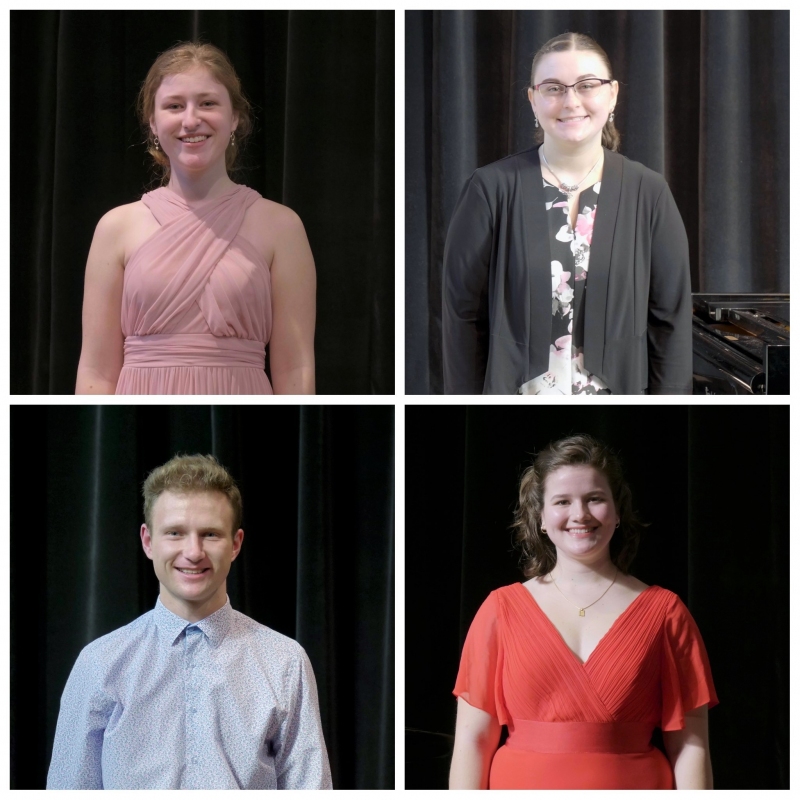
Dual winners mark the 16th annual Verna Mae Janzen Music Competition
Pandemic-friendly format change distinguishes vocal and piano categories
 The 2021 Verna Mae Janzen Music Competition winners (clockwise from top-left): Johanna Klassen (voice), Georgeanne Van Helden (piano), Michelle Fast (voice), and Georg Neuhofer (piano)
The 2021 Verna Mae Janzen Music Competition winners (clockwise from top-left): Johanna Klassen (voice), Georgeanne Van Helden (piano), Michelle Fast (voice), and Georg Neuhofer (piano)
For the past 16 years, the CMU School of Music hosts the Verna Mae Janzen Music Competition for music students capable of performing at a high skill level. It is a time, as adjudicator Henrietta Schellenberg puts it, "of comradery and competition for music students, a chance to bring their art to the public, a jewel in the life of the musical calendar at CMU."
In order to meet current pandemic standards of safety, this year's competition was split between two separate categories and awarded winners in both voice and piano. Performances were held in an empty music hall with only a videographer and a camera.
Dr. Matthew Pauls, Assistant Professor of Music and host of this year's competition, shares that "singing to an empty hall has its advantages and disadvantages. The advantage is that there is less pressure without an audience. The disadvantage is that there is less pressure without an audience. It is amazing what an audience can give back to a vocalist in terms of positive feedback, but also in terms of provoking nerves."
Out of this year's five vocalists and four pianists were winners Johanna Klassen (voice) and Georgeanne Van Helden (piano), with runners-ups Michelle Fast (voice) and Georg Neuhofer (piano).
Klassen, a third-year student in music education, reflects on her performance experience, in which she performed a piece from Johannes Brahms and a Spanish selection from Joaquin Rodrigo: "For singers, you are talking to people and telling stories to people. To do this virtually really takes some incredible imagination. You begin by telling the story to yourself and your pianist. You want to make sure that what you are doing does not look fabricated."
Not only are performers judged on their diction, correct style, and open sounding voice, but also on their confidence and honesty of emotion. Schellenberg comments that "especially for singers, they are up on stage using their bodies, their face, and their voice to display something incredibly intimate. You cannot teach them emotion. We teach them the theoretical and stylistic artifices, but even in professional performers, an audience can tell when something does not come from the soul. These are the moments when we exclaim 'golly! That's the magic we are looking for!' And this is exactly what we should be looking for in these undergraduates, for a chance to hone that type of emotion."
Undeniably, it was this "honesty of emotion" that awarded Van Helden, a third-year music performance student, for her piano performances which included the free-flowing joyous fury of Johann Sebastian Bach and the piquant, grief-inducing harmonies of Maurice Ravel. As Van Helden puts it, "when I first started playing Bach, I was intimidated by the harmonies and the different ways of how he structures his music. Now, I cannot go a year without playing Bach. The pieces become more special to me the more I place my emotion into them."
The Verna Mae Janzen Music Competition is made possible by Peter Janzen of Deep River, Ontario, and named in memory of his wife, Verna Mae, who died of cancer in 1989 at age 53. First-place winners receive $700, while second-place winners receive $500.
Printed from: media.cmu.ca/story-2021-verna-mae-janzen-music-competition